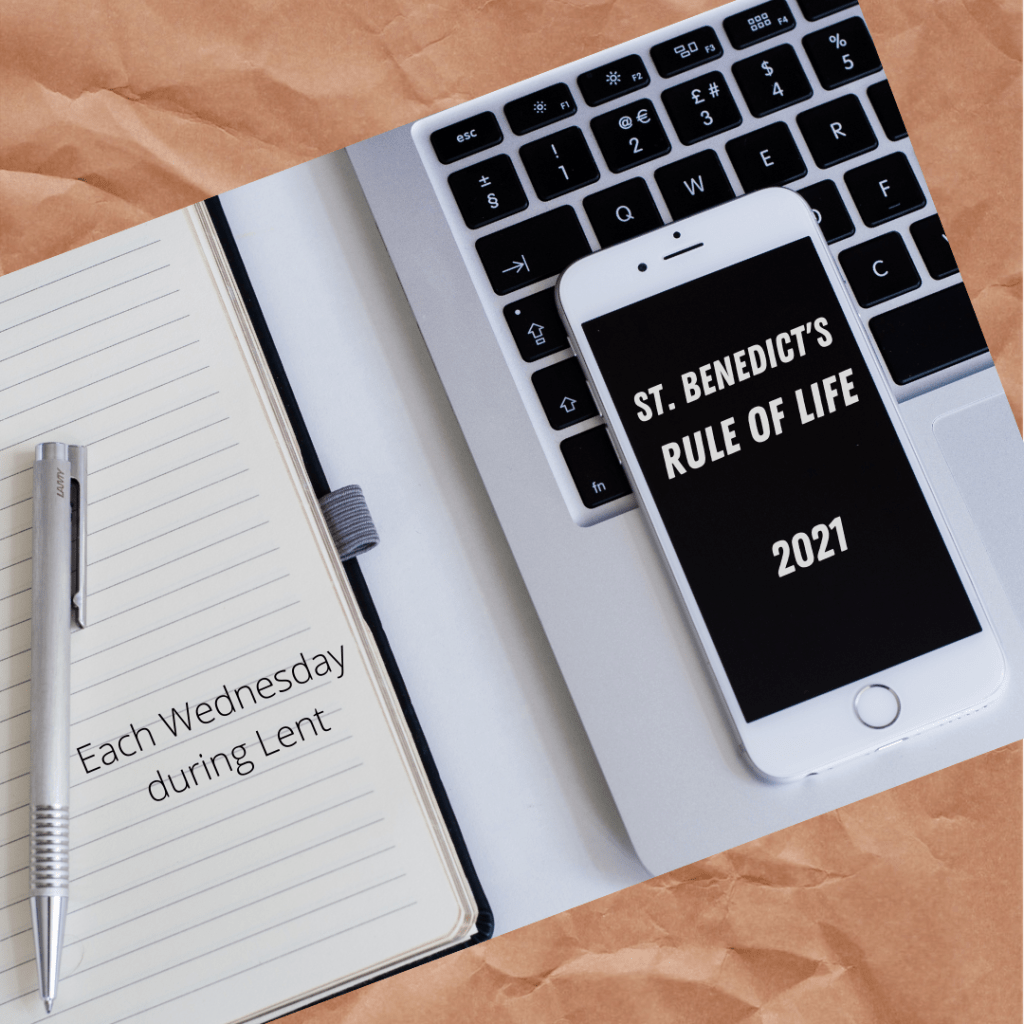
To be obedient is often equated with being weak, incapable of making decisions, or having intelligence or creativity. In our current politicized environment, being obedient to COVID mandates has become a political stance for some. For many, obedience describes what we feel others owe us. As Americans, many of us think of obedience as subservient behavior or an infringement on our rights. St. Benedict’s vision of obedience is different.
First, Benedict understood the Latin root for obedience means “to listen thoroughly or deeply. The Rule states,
For a lifetime, the monk’s first obligation is always “to listen.” He will listen – and listen to God – in the reading of the Scriptures, in the liturgy, in the Rule, in the tradition, in his abbot, in his reading, in his quiet prayer, in hos fellow monks, and in his heart, (RB Prologue 1).
Obedience for St. Benedict, therefore, is not listening just with the mind as an intellectual exercise, but with the heart, which is the root of love/respect. Benedict coins the phrase “listen with the ear of your heart.”
In the Rule Benedict describes obedience as both listening and responding. “Those who practice obedience set aside their own concerns, plans, and tasks in order to quickly respond to the request. The requested action would be completed without hesitation, almost at the same moment the request was made (RB 5.7-9) The true sense of obedience is listening to God, to another person, and to our lives and responding to what we hear because of love/respect.
Several weeks ago, I was invited to help my daughter in Atlanta with my newborn granddaughter and 4 yr. old grandson. Tending to their needs brought me the deepest sense of gratitude because I was obedient to their needs and responded with pure love.
Being obedient to family can be much easier than being obedient within a community. I think for me, this is because I have experience of being forced to be obedient to leaders and managers, who did not exemplify good integrity. The Rule offers strict instruction on the role of those in leadership, whom others are pledged to obey.
- Lead a life that would teach what was good and holy and not only by what he said but what he did – the old quip “Do as I say and not as I do” was not in Benedict’s vocabulary (RB 2.12);
- Never teach or ask for anything that would be incompatible with Christ’s instruction (RB 2.4);
- Avoid favoring one person over another (RB 2.16);
- Hate the sins but love the brother (RB 64.11); let mercy triumph over judgment (RB 2.13 and RB 64.10);
- Show foresight and consideration in the orders that he would give (RB 64.15) and strive to be loved rather than feared (RB 64.17);
- Not be easily agitated or anxious, or demand too much of others or be a perfectionist or be filled with suspicion of others (RB 64:16);
- Follow the footsteps of Jacob who said, “If I drive my flocks too hard, they will die in a single day” (Gen 33:13 and RB 64.18).
The Rule goes on to instruct that if anything important is to be done in the monastery, the entire community is called together to give advice to the abbot. ALL are to be heard and special care should be taken to listen to the younger members of the community because God often reveals what is better to the youngest (RB 3.3).
Obedience is accountability in community and in relationships. We put others before ourselves. We strive to be honest and open. Obedience is laying aside my plans, my desires, my life, for God and for others. In the Benedictine sense, obedience is not what we can expect from others. Obedience is what we do ourselves for others.
Practicing Obedience
A way to begin is to practice loving God and our neighbor. This sounds so quaint but respecting the dignity of every human being and keeping our eyes and hearts focused on God will help us create new muscle memory. Discovering God’s will by letting go of our own desires and by not trying to control every minute of our days and every outcome of our lives is a solid start. We, therefore, can view our daily tasks and responsibilities as God’s will for us and do them in love and respect for others. The most holy responsibility we can offer is to respect one another and let this respect guide our words, our choices, and our responses. This is obedience.
Obedience through our Relationship with our Creator
Obedience is simply listening to God in our daily encounters and responding is a respectful and selfless way.
Benedictine obedience is a two-step process:
- Open your eyes to movements and light of the Creator’s presence. This light both guides and encourages. The light is always there. It is us who loose focus. Open your eyes, ears, and heart to seek the answer to this question: what is God asking me to do or be in this situation?
- Let your knowledge of Christ or the divine presence guide you. With a gentle heart, respect, seek peace amid conflict, practice forgiveness, and offer patience. When you feel your hearts hardening against a person or situation, it is a warning to set aside your ego and let the Spirit be your guide.
Remembering a Time of Obedience
Obedience is not just doing what we need to check a box; it is seeing what needs to be done and responding with a deep sense of gratitude to fulfill the need fully with love and gratitude in your hearts. It is listening and responding to what our Creator is placing before us.
Reflect on a time when you experienced an unforeseen distraction or a spontaneous request to help someone that you responded to.
- What did you experience? How was it positive? How was it negative?
- What plans and needs did you have to set aside to respond?
- In the experience you recalled, how did you listen and respond?
Now repeat the process but reflect on a time when you are in a leadership position.
- How did your leadership teach others what was good and holy?
- Did your leadership style strive for respect or fear?
- How did you keep from showing favoritism? If you showed favoritism, how could responses be shifted in the future to avoid favoritism?
- What did you request that aligns with Christ’s teachings?
Grumbling
Benedict cautions us against polluting our acts of obedience with grumbling, which destroys us as well as the communities of which we engage. We grumble to ourselves and we grumble to others. Either are damaging.
Grumbling is natural, so it may be hard at first to recognize or to accept how often we catch ourselves. However, these are the most common signs:
- Negative thoughts about a person or a situation
- Obsessive thoughts about a person or a situation
- Comparison between ourselves and others that are negative towards the other person
- Feelings or actions rooted in envy or jealousy
- Justifying our poor behaviors either to ourselves or aloud
- Persistent negative feelings or outlooks on life
- Talking or thinking negatively about others
- Lack of a sense of humor
What are other signs of grumbling?
- Do you hear grumbling in your heart?
- What kinds of situations bring forth grumbling for you?
- Who do you grumble about and why?
Your invited to journal for your own edification and/or add comments to the blog feed of what worked or did not work for you when dealing with obedience. Next Wednesday we will explore the topic of humility.
May you experience a holy Lent that offers you a place of solace and holiness.




